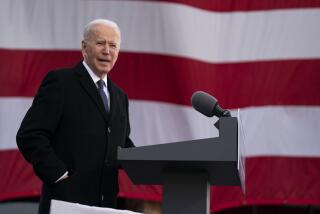White House Aims to Get Public to Demand Health Care Reform : Medicine: Senator says the Administration will point out flaws in the current system with events that will include speeches, meetings and rallies.
WASHINGTON — The Clinton Administration will launch a nationwide campaign next month to call attention to America’s health care woes and try to rouse the public to demand congressional approval of reforms, a Democratic senator said Thursday.
Sen. John D. (Jay) Rockefeller IV (D-W.Va.), announcing the White House strategy, said that preparing the reform plan and the sales campaign is like “getting ready for Normandy Beach, and Hillary (Rodham Clinton) has been (Gen.) Dwight Eisenhower,” a reference to the World War II allied invasion of Nazi-occupied Europe.
The President will decide on the content of the reform program by the end of August and the Administration will follow with a series of public events--rallies, meetings and speeches--in September to generate enthusiasm.
“There is nothing so beautiful to me as an enraged public focused on an issue,” said Rockefeller, who has been deeply involved in the health care reform plan.
President Clinton will “begin a health care conversation with the nation” in August, probably in a speech to the National Governors’ Assn., Rockefeller said. He is to outline the proposed reforms in late September in a major presidential speech to a joint session of Congress, with the legislation to go to Capitol Hill soon afterward.
The Administration’s strategy will be to dramatize flaws in the current health care system, under which prices are rising rapidly and 37 million Americans lack insurance. “If we have done our job” in stirring up voters, “woe be the Republican or Democrat who votes ‘no’ on health reform,” Rockefeller said.
Despite the enthusiasm and determination of the Administration and supporters, the health reform plan faces major obstacles, principally linked to the cost of meeting Administration promises to provide everyone with a generous package of benefits.
The basic plan would require all businesses to provide health insurance for their workers, with companies paying about 80% of the cost. Total spending for businesses is expected to be about 7% or 8% of payroll costs, whereas workers would contribute about 2% to 3% of their pay, although no final decisions have been made. Small businesses, however, are likely to receive a temporary subsidy, keeping the cost at 3% or 4% of payroll.
Administration planners had considered a payroll levy deducted from every paycheck but now believe that this is politically risky because it would look like a new tax. Instead, current plans call for the money to be collected as a premium, which Americans pay on nearly all forms of insurance, rather than as a payroll deduction. However, the financial impact on management and workers would be the same.
The present system of insurance premiums paid by businesses and individuals would be replaced by the new universal, national premium. Money collected through the premiums would go to health alliances covering a geographic region. Those health alliances would in turn negotiate with insurance companies, health maintenance organizations and other groups that have enrolled large networks of doctors and hospitals.
Once the system is in place, Americans would enroll in the local network of their choice. The unemployed would continue to receive coverage but would not have to pay premiums until they returned to work.
The Administration’s top health planners will not decide on the precise details of financing and coverage until September and could face strong opposition from a Congress already wary of the tax hikes contained in the budget package. “In the first few weeks in September, you’ve got to crunch the numbers,” Rockefeller said.
President Clinton originally promised to deliver a health care reform plan within the first 100 days of his Administration, with hopes that it could be passed this year. Even the staunchest Administration supporters now concede that the intense national debate will take months after the plan is announced and that legislative action probably will not be completed until the middle of 1994, an election year.
More to Read
Sign up for Essential California
The most important California stories and recommendations in your inbox every morning.
You may occasionally receive promotional content from the Los Angeles Times.










